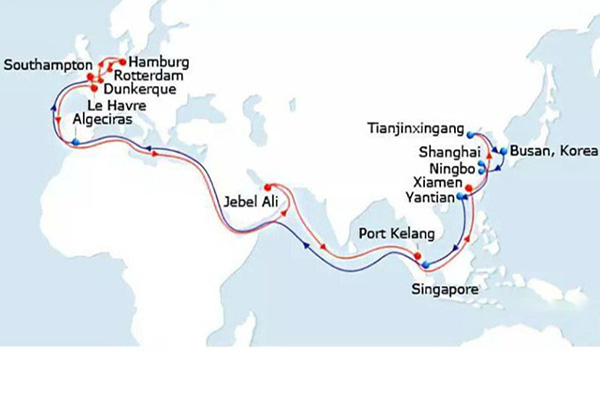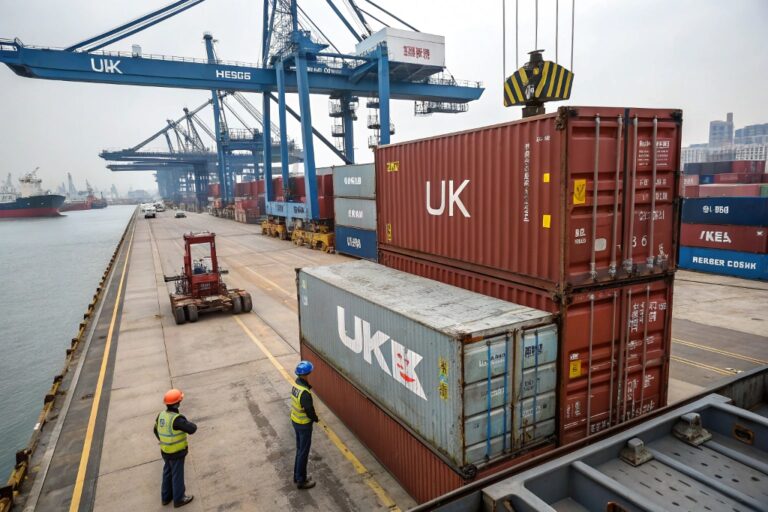China has established itself as the world’s largest manufacturing hub, engaging in frequent trade interactions with countries across the globe. If you are looking to source products from China, B2B platforms can help you quickly connect with manufacturers and trade companies. Here’s an expanded overview of some popular B2B websites, highlighting their key features and benefits for sourcing Chinese products:
1. Alibaba
As one of the largest B2B marketplaces in the world, Alibaba connects millions of buyers and suppliers. Alibaba is the leading B2B trading platform, and whether you’re an experienced trader or just starting out, you are likely familiar with this platform to some extent.

– Extensive Product Range: Millions of products across numerous categories, from electronics to textiles.
– Global Reach: Connects international buyers with manufacturers in China and beyond.
– Trade Assurance: A service that protects your orders by offering refunds if suppliers fail to meet the contract terms.
– Supplier Verification: Alibaba offers verified supplier statuses to help buyers identify trustworthy sellers.
– Custom Manufacturing: Facilitates the sourcing of custom products through its “Request for Quotation” (RFQ) feature.
2. Made-in-China
Made-in-China.com is a comprehensive online directory designed to connect international buyers with Chinese manufacturers. It showcases a wide range of products, particularly in the tools and machinery sectors, while also encompassing various industries such as machinery, hardware, and consumer goods.
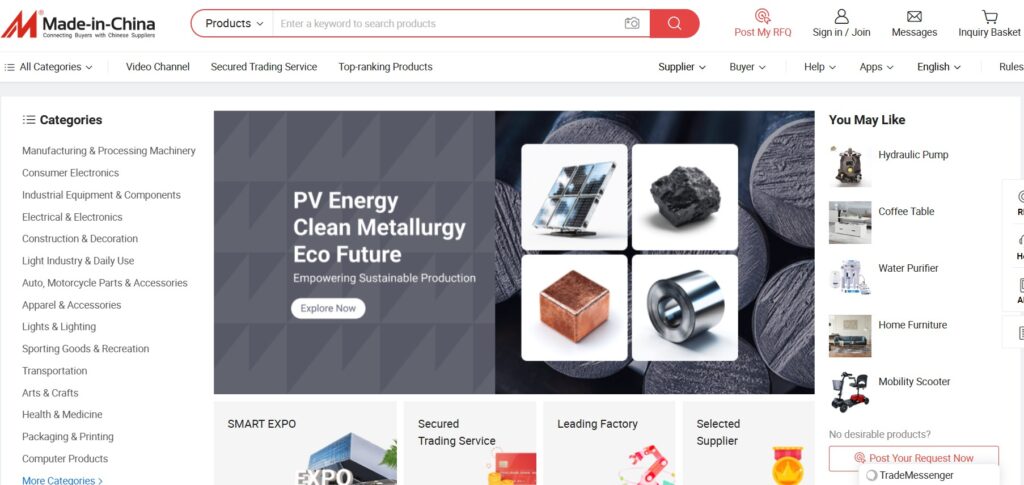
Whether you are sourcing precision machinery, durable hardware, or innovative consumer products, this platform serves as an invaluable resource for businesses operating in these fields. With its user-friendly interface and extensive database, Made-in-China.com makes it easy for you to find reliable suppliers and explore the latest offerings from Chinese manufacturers.
If you are involved in business within these industries, Made-in-China.com is an ideal platform for you to enhance your sourcing experience and discover potential partnerships that can help you grow your business.
3. Global Sources
Global Sources may not be as well-known as Alibaba or Made-in-China, but it is still a significant player in the online procurement landscape. Many Chinese companies actively choose to register on this platform for marketing purposes, leveraging its resources to reach a broader international audience.
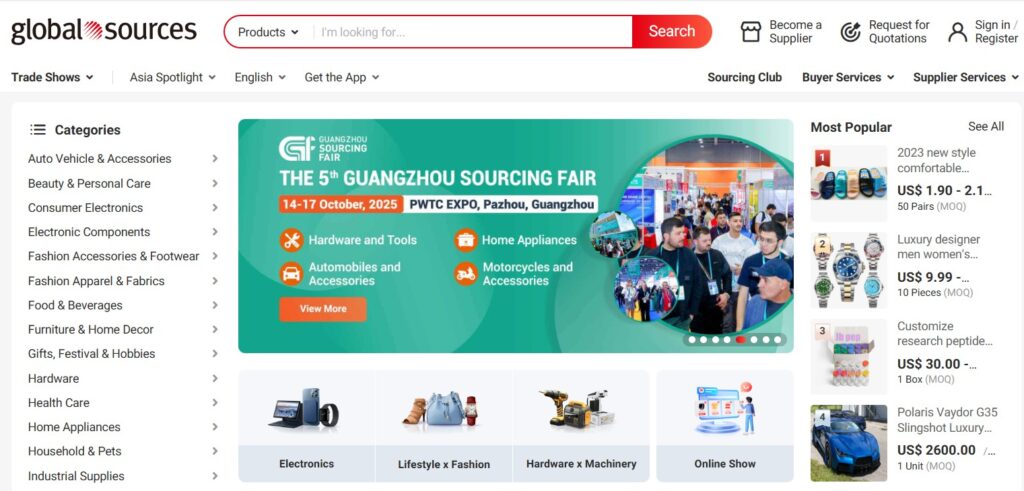
Originally founded to facilitate trade exhibitions, Global Sources continues to prioritize events as a key avenue for customer acquisition. The platform hosts various industry-specific trade shows that attract a large number of qualified buyers, ensuring that inquiries generated through these exhibitions tend to have a higher quality. This focus on in-person interactions and relationships is a distinctive feature of Global Sources that sets it apart from other platforms.
In addition to its exhibition roots, Global Sources also offers a robust online directory where buyers can explore a diverse range of products from verified suppliers. This allows businesses to not only connect with manufacturers but also gain insights into market trends and emerging products.
4. Yiwugo
Yiwugo, as suggested by its name, is a platform that primarily features products from Yiwu, known for its extensive range of small commodities. The site offers a diverse selection, including jewelry, handbags, hardware, crafts, and beauty products. Yiwugo significantly facilitates trade for wholesalers and retailers looking to source small goods from China.
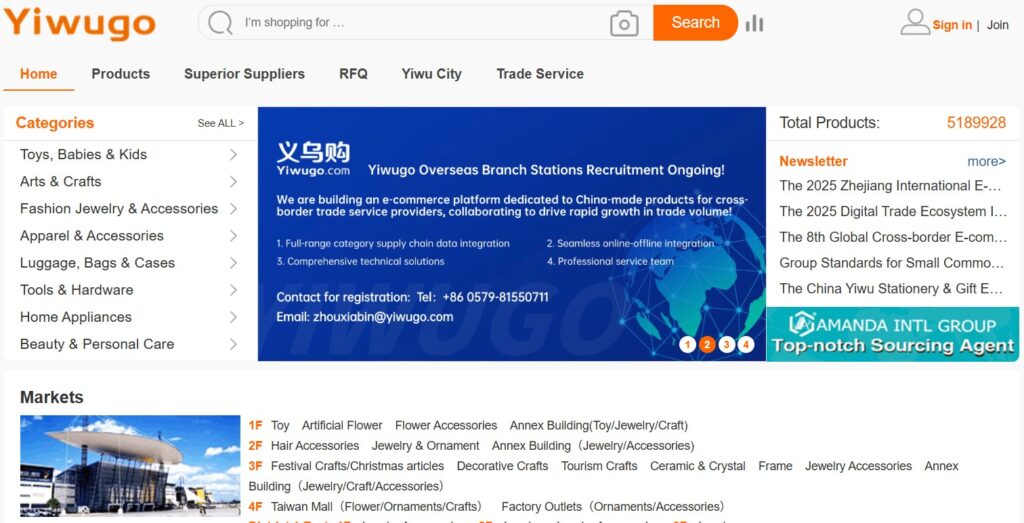
One of the key advantages of this platform is its low minimum order quantities, making it particularly appealing for customers who engage in small-scale wholesale purchasing. Although prices are listed on the website, they may not always be entirely accurate, so it’s advisable to negotiate directly with suppliers for better terms. With its user-friendly interface and vast product variety, Yiwugo is an excellent resource for anyone seeking affordable small commodity options.
5. Aliexpress
International customers utilize this platform to connect with Chinese factories and trading companies. However, recent trends indicate a significant decline in traffic to the platform, likely influenced by the rise of social media and cross-border platforms such as Temu and Shein.

These competitors have captured a considerable share of the market by offering innovative shopping experiences and a wide range of products. As a result, the platform may need to explore new strategies to enhance user engagement and attract more buyers looking to source products from China.
6. 1688
1688 is the largest B2B platform in China and operates under the same company as Alibaba. Nearly all Chinese suppliers have stores on 1688, most of which are factories focused on domestic trade—though some also handle international business. Many foreign buyers have discovered this hidden gem and flock to the platform to source suppliers. Originally designed for Chinese companies, 1688 now attracts a growing number of international buyers.

However, the platform’s biggest drawback is the lack of an English version—it’s only available in Chinese. This is because its English counterpart is essentially Alibaba. That said, the language barrier isn’t a major hurdle these days, given the abundance of auto-translation tools.
One key reason foreign buyers turn to 1688 is the lower prices and wider supplier selection compared to other platforms.
Another challenge is that many factories on 1688 primarily deal with domestic trade, so they often struggle with communication and lack familiarity with standard international trade processes.
7.DHgate
Unlike B2C platforms like Temu and Shein, DHgate specializes in serving small-to-medium buyers—such as U.S. brick-and-mortar retailers and independent e-commerce sellers—with end-to-end solutions spanning product sourcing, payment, and logistics. Its “small-batch, rapid-response” model aligns perfectly with today’s fragmented global supply chains. In 2024, the platform processed over 500,000 daily orders on average, with 70% of transactions ranging between $500 and $2,000.
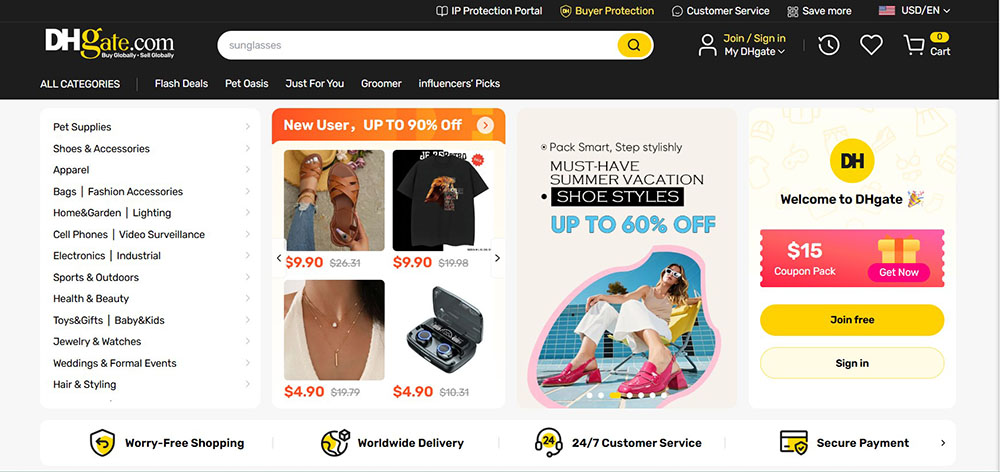
Key Innovations:
Smart Order-Splitting System: Automatically analyzes product attributes and destination tariff policies to generate optimal package-splitting solutions—all in just 0.3 seconds per order.
AI-Powered Product Selection & Marketing: The “Feitian” AI model, trained on 20 years of transaction data, predicts trending products with uncanny accuracy, boosting merchants’ inventory precision by 40%.
Hyper-Localized Multilingual Support: AI translation covers 12 languages (including German, French, and Spanish), increasing product page conversion rates by 271%.
Closing the “Last Mile” in Logistics & Payments
DHgate’s global warehouse network spans 20 locations (U.S., UK, Germany, etc.), enabling *3-day delivery*—three times faster than traditional cross-border shipping.
8.HKTDC
Here’s the English translation of your provided Chinese text about Hong Kong Trade Development Council (HKTDC)
Hong Kong Trade Development Council (HKTDC) Website – hktdc.com
The HKTDC website (www.hktdc.com) is an effective platform connecting global buyers and suppliers. It provides comprehensive trade and economic news, trends and statistics, laws and regulations, market overviews, Mainland infrastructure and work guides, as well as key reports and analyses on important issues.

HKTDC offers the latest trade news and trend analysis, helping users stay informed about market dynamics and industry developments.
Laws, Regulations & Market Insights: The website features detailed legal and regulatory information, along with market overviews, assisting businesses in understanding relevant policies and market conditions.
Mainland Infrastructure & Work Guides: It provides guidelines on infrastructure development and business operations in Mainland China, helping companies adapt to the market.
Reports & Analysis: Includes in-depth reports and analyses on current economic, trade, and market trends
9. ECVV
ECVV is a renowned global B2B (Business-to-Business) e-commerce brand, currently holding the third-largest position in China’s B2B industry. With the vision of becoming a “cost-effective yet premium global trade promotion service provider” and the “preferred industrial procurement platform for Arab countries,” ECVV is committed to facilitating international trade
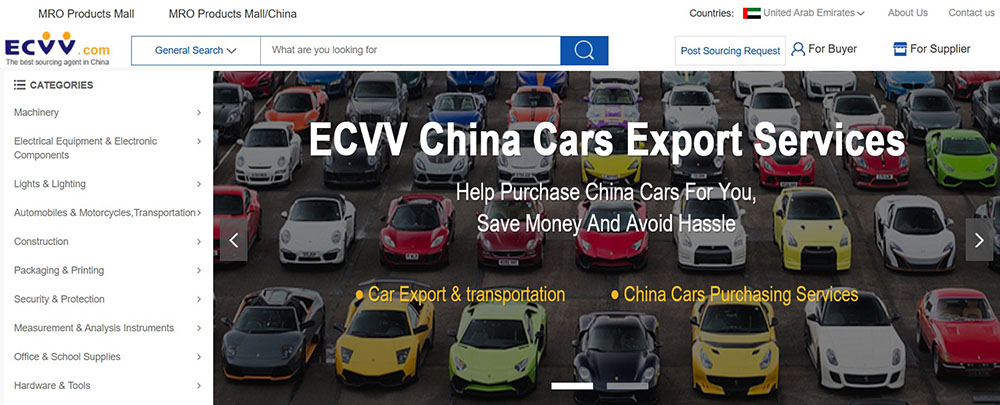
The name “EC” stands for E-Commerce, while “VV” represents “Victory-Victory” (win-win). In the company’s logo, the two “V” letters are stylized to resemble business professionals, symbolizing the core users of ECVV—buyers and sellers engaging in trade. This design reflects ECVV’s aspiration for the e-commerce industry: to create a win-win outcome for buyers and sellers, as well as employees and the company itself.
10. Globy
Globy.com is a B2B e-commerce platform dedicated to global trade, designed to provide businesses worldwide with an efficient and convenient trading environment. The platform covers multiple industries, including agriculture, apparel, beauty & personal care, chemicals, construction, consumer electronics, and more, helping businesses connect and trade globally.
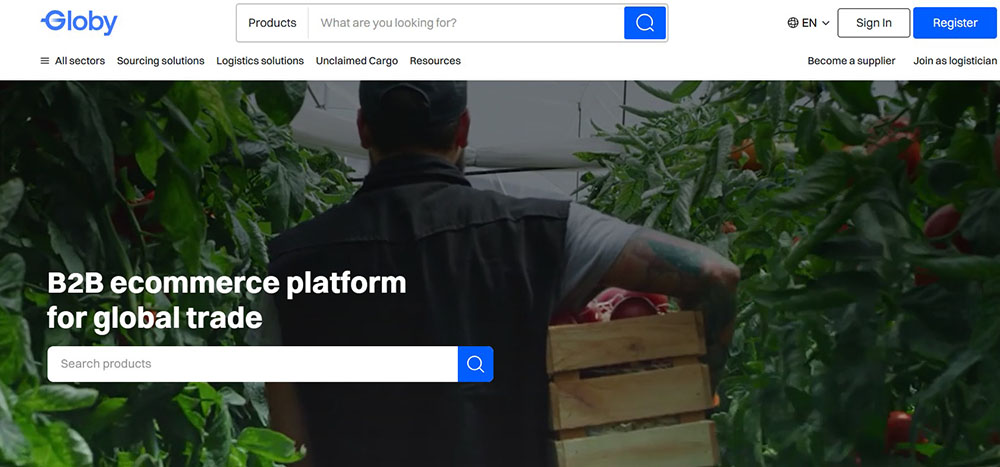
Key Features & Services
Product Discovery & Company Search: Users can explore a wide range of products and services while researching supplier information, facilitating new business connections.
Logistics Solutions: Globy offers fast and efficient logistics services, including a freight calculator to find optimal shipping solutions and obtain instant quotes—saving time and effort.
Community Support: The platform fosters a global trade community, supporting merchants in building long-term partnerships. Currently, it has over 50,000 global traders from 120+ countries.





